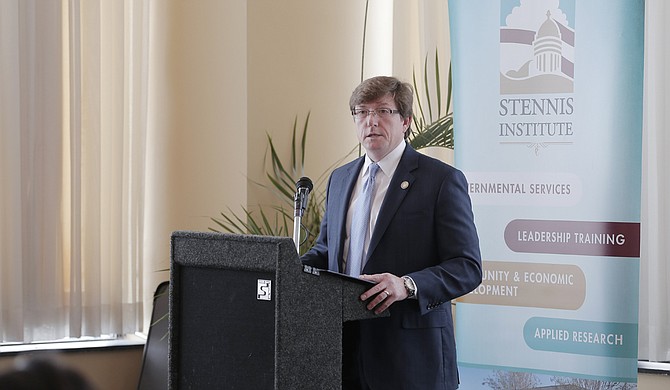Rep. David Baria, D-Bay St. Louis, spoke to the Stennis Capitol Press Forum about the House Democratic Caucus' priorities for the 2016 legislative session. Photo by Imani Khayyam.
Potholes aren't political. Or shouldn't be.
That was the sermon Rep. David Baria, D-Bay St. Louis, preached Monday in downtown Jackson. Both Democrats and Republicans, he said, should be able to agree on fixing the state's crumbling infrastructure, especially because if our infrastructure is good enough, corporations can bring in high traffic.
"There's no Democrat(ic) or Republican way to fix a pothole," Baria, the new House minority leader, said. "Although we haven't seen a proposal, yet, I don't think our Republican leadership will choose to stand idly by while our citizens play chicken with faulty bridges and disintegrating roads."
Democrats have less power in the Mississippi Legislature than in previous years with the loss of former Rep. Bo Eaton, which gave Republicans a supermajority in the House of Representatives. After Republicans refused to seat the winner of the straw vote in the tied race, remaining Democrats chose Baria as their minority leader. Baria, addressing the Stennis Capitol Press Forum Monday, said that the top three priorities for Democrats are infrastructure, public education and responsible budgeting.
While infrastructure might be an easy place for both parties to meet in the middle, the state's budget and education are more difficult to agree on. Baria said Democrats want to work with Republicans on public education, especially after Republican leadership made fully funding the Mississippi Adequate Education Program a campaign promise a few years ago. Most Democratic lawmakers do not agree with legislation for private-school vouchers or punishment for teachers who advocate for their schools, however.
"We believe if these ideas were enacted into law, they would serve to turn back the clock on the progress we have made in education in Mississippi," Baria said.
Mississippi's economy is one of only a few left in the country that has yet to hit the baseline it was at before the recession in 2008. Baria voted yes on the recent special-session economic-development projects bill that should bring 3,500 jobs to the state, but he questioned the Republican leadership's desire to cut the franchise tax and other tax breaks proposed in the current session. Baria said the inventory tax will cost the state $126 million in revenue that we would have had otherwise.
"We should demand that these corporations honor our investment and leave our state better than we found it," he said.
Expanding Medicaid would also bring jobs to the state, Baria argued, and help the state's hospitals that are in need of resources. By accepting the federal dollars with Medicaid expansion, the state would create 9,000 jobs at a cost of $43,000 per job, Baria said, compared to 3,500 jobs from the recent special economic session vote at $78,000 per job.
"The only real reason to ignore the deal offered Mississippi by the Affordable Care Act is out of begrudging frustration with presidential politics," Baria said. "Medicaid will eventually pass us by, and we will be worse of for it."
Despite the small political influence Democrats now hold in the Legislature—and particularly in the House—Baria said he is ready to work with anyone who wants to reach across the aisle.
"Our state is truly at a crossroads," Baria said. "We are aimed in a direction that is consequential and potentially dangerous."
Email state reporter Arielle Dreher at [email protected]. Read more coverage of the Mississippi Legislature at jfp.ms/msleg.



